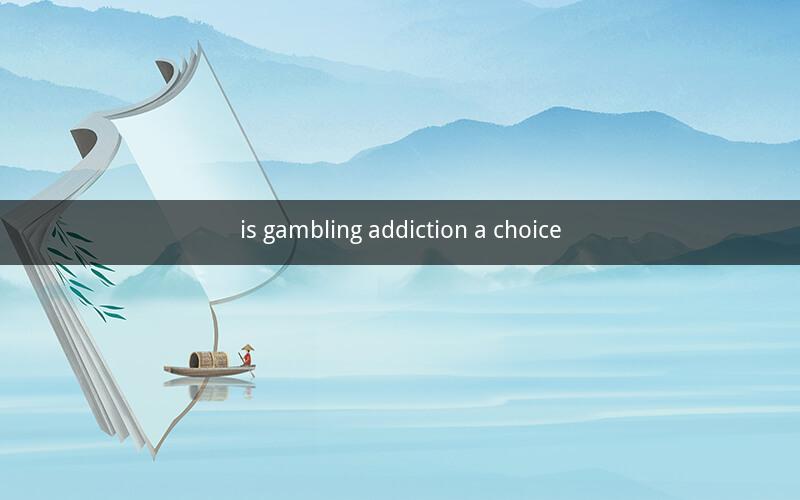
Directory
1. Introduction to Gambling Addiction
2. Defining Choice in Addiction
3. The Role of Personal Responsibility
4. Genetic and Environmental Influences
5. The Psychological Aspect of Choice
6. Societal and Cultural Factors
7. The Concept of Free Will
8. The Legal and Ethical Implications
9. Treatment and Prevention Strategies
10. Conclusion
1. Introduction to Gambling Addiction
Gambling addiction, also known as problem gambling, is a complex condition that affects individuals of all ages, backgrounds, and socioeconomic statuses. It is characterized by the inability to control or stop gambling despite negative consequences. While some argue that gambling addiction is a choice, this article explores the various factors that contribute to this disorder, challenging the notion that it is solely a matter of personal responsibility.
2. Defining Choice in Addiction
The concept of choice in addiction is often misunderstood. In everyday language, choice implies the ability to make decisions freely and independently. However, in the context of addiction, the ability to choose is compromised by the powerful hold that substances or behaviors have over the individual. This raises questions about the extent to which an addicted person can be said to have made a "choice" in the traditional sense.
3. The Role of Personal Responsibility
While personal responsibility is an essential aspect of human behavior, it is not the sole determinant of addiction. Factors such as genetics, environmental influences, and psychological vulnerabilities play significant roles in the development of gambling addiction. Blaming individuals for their addiction can be harmful, as it may lead to stigma and discourage them from seeking help.
4. Genetic and Environmental Influences
Research indicates that genetics play a role in the susceptibility to addiction. Certain genetic markers have been associated with a higher risk of developing gambling addiction. Additionally, environmental factors such as exposure to gambling at an early age, family history of addiction, and social influences can contribute to the development of problem gambling.
5. The Psychological Aspect of Choice
The psychological aspect of choice in addiction is complex. Many individuals with gambling addiction experience a distorted sense of control, believing that they can stop whenever they want. This perception is often influenced by cognitive biases and the psychological effects of addiction, which can make it difficult for individuals to recognize the need for help.
6. Societal and Cultural Factors
Societal and cultural factors can also influence the development of gambling addiction. The normalization of gambling in certain cultures, the availability of gambling opportunities, and the marketing of gambling as a form of entertainment can contribute to the prevalence of problem gambling.
7. The Concept of Free Will
The concept of free will is central to the debate over whether gambling addiction is a choice. Proponents of free will argue that individuals have the capacity to make autonomous decisions and are responsible for their actions. However, critics argue that free will is limited in the face of addiction, as the addicted person's ability to choose is compromised by the influence of their addiction.
8. The Legal and Ethical Implications
The legal and ethical implications of whether gambling addiction is a choice are significant. If addiction is considered a choice, individuals may face stricter legal consequences. However, if addiction is recognized as a disorder, individuals may be more likely to receive treatment and support.
9. Treatment and Prevention Strategies
Effective treatment and prevention strategies for gambling addiction are essential. Treatment approaches may include cognitive-behavioral therapy, support groups, and medication. Prevention efforts can focus on education, awareness campaigns, and policies that limit the availability of gambling opportunities.
10. Conclusion
In conclusion, while personal responsibility is an important factor in addiction, it is not the sole determinant of gambling addiction. A combination of genetic, environmental, psychological, and societal factors contributes to the development of this disorder. Recognizing the complexity of addiction can help reduce stigma and promote a more compassionate approach to treatment and prevention.
Questions and Answers
1. Q: Can individuals with gambling addiction choose to stop gambling?
A: Individuals with gambling addiction may desire to stop gambling, but their ability to do so is often compromised by the addiction itself.
2. Q: Is genetics a significant factor in the development of gambling addiction?
A: Yes, genetics play a role in the susceptibility to gambling addiction, with certain genetic markers associated with a higher risk.
3. Q: How can societal and cultural factors contribute to the development of gambling addiction?
A: Societal and cultural factors such as the normalization of gambling and the marketing of gambling as entertainment can contribute to the prevalence of problem gambling.
4. Q: What are some effective treatment approaches for gambling addiction?
A: Effective treatment approaches include cognitive-behavioral therapy, support groups, and medication.
5. Q: Can environmental influences be controlled to prevent gambling addiction?
A: Yes, environmental influences such as limiting the availability of gambling opportunities can be controlled to help prevent gambling addiction.
6. Q: How can stigma be reduced in the context of gambling addiction?
A: Stigma can be reduced by promoting awareness, education, and compassionate approaches to treatment and support.
7. Q: What is the role of free will in addiction?
A: The role of free will in addiction is complex, as addiction can limit an individual's ability to make autonomous decisions.
8. Q: How can legal and ethical implications affect the treatment of gambling addiction?
A: Legal and ethical implications can affect the treatment of gambling addiction by influencing the availability of resources and the approach to treatment.
9. Q: Can prevention strategies be effective in reducing the incidence of gambling addiction?
A: Yes, prevention strategies such as education and policy changes can be effective in reducing the incidence of gambling addiction.
10. Q: How can society support individuals with gambling addiction?
A: Society can support individuals with gambling addiction by providing access to treatment, support groups, and resources that promote recovery.